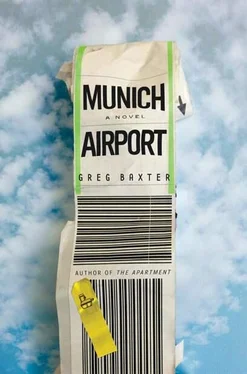Ten times? I said.
Well, maybe just the same size, maybe twice the size.
Where will you exhibit it?
She named a large, important-sounding gallery in Barcelona, but not in a way that made her sound pompous. She said it with a shy grin, as though she herself could barely believe it. If I exhibit at Tate Modern, I will make it ten times this size, she said.
It was really late when we left the studio. We hadn’t been flirting in an obvious way, or touching, but there was something between us, and I think we both had the sense that if anything was going to happen, it would have to happen soon. I felt completely disarmed by the experience I’d just had, and not quite deserving of her, so I did not try to kiss her, even though it seemed like kissing would have been appropriate. She said, Please tell me you are not a diplomat. I’m not a diplomat, I said. Please tell me you do something completely insipid, you’re a lawyer or an accountant, or a graphic designer. I gave her a funny look. Well, she said, then tell me you’re something evil, like a journalist or a politician. I said, I’m in marketing. Marketing! she exclaimed. That’s marvelous, that’s a hundred times worse. I said, You don’t hear the word marvelous much anymore.
We walked along a lot of empty, dark streets — I mean the windows were dark, and the place seemed very sleepy. She said Brussels was so dull that, after midnight, you could walk down the middle of any street you liked, and she liked to do that. While we were in her studio, a cold front had arrived, just like that, and now the skies were gray, and there was a chill. That chill felt nice after the week of weird, swampy heat, though the chill would transform, in a day, into the return of winter in central Europe, and my father would feel quite proud of himself for splurging on a warm coat. The clouds, which were low, and which absorbed the lights of the city, were bright and fluorescent, and they moved swiftly.
What did you want to become? she asked.
When I was younger?
When you dreamed of your future, I suppose.
Oh, I said, I don’t buy in to that stuff.
What do you mean?
I tried to think of a way to formulate a response that did not sound depressing or dismissive. She meant the question honestly. I think she even meant it kindly, as in, I seemed like the kind of person who could be more, or achieve more, than what I had become and achieved in my life. And she based this on the fact that she thought I liked her music, or her installation, or whatever the best word to describe it was, and because, like all artists, she based her belief on the potential of others to be more or achieve more by their capacity to appreciate her music, even though — and perhaps it isn’t true in her case — what often happens is that artists base their faith in others on their incapacity to recognize bullshit, or their unwillingness to declare bullshit when they see it. But I did like what she had done. I liked it because she was a nice person and because it was entertaining, and certainly thrilling at times, and I liked the fact that it had offered a respite from the ordinary. And, yes, there was a beauty to it. I could not help thinking, however, that all the thoughts a human being could have about the experience of being in that room were predictable, that the only way to connect to her piece — or to art in general — was intellectually, because to connect emotionally to art was naive and quasi-religious, or because emotion no longer belonged to art, it was simply a currency of pre-existing phrases — musical or visual or grammatical — to describe categories of human conditions. Nevertheless, I thought about her question, and though I said nothing, I decided that if I could have been anything, I would have liked to be a doctor.
It’s a mean question, she said, I take it back.
What do you think I would like to be?
She stopped and looked up at the sky. Then she looked at me, measuring my width and height. An archaeologist, she said.
We were less than five minutes away from my hotel. She knew where I was staying, so, without discussion, we simply walked in that direction, and when we arrived she came inside the lobby. I asked if she would like a drink at the hotel bar and she gave it some thought. Not really, she said. So we got in the elevator and went up to my room. In the elevator she said, It’s funny, I’ve been here almost a year, I’ve got a few months left, and I have no idea what’s happening in the world, I don’t read papers, I don’t watch television, I don’t read any letters I receive, not even ones that look official, I don’t meet other people in the building where my studio is, or have coffee with my neighbors, I don’t have any friends here, I don’t want to make friends, I don’t have a telephone or e-mail, my parents have died, I have no children. Every few months I just meet a stranger and talk nonsense for a few hours.
In bed, she lay there with her arms crossed, like she was having very deep thoughts that did not at all concern me or this night. I said, Do you have nightmares? She stopped thinking about whatever she was thinking and said, Yes, of course.
What are your nightmares about? I asked.
Let me think, she said. I dream that I am being chased but can’t run. I dream that I am being stabbed. I dream that I am being raped. I dream that I burn to death. I dream that my womb is full of centipedes. I dream that I drown. The usual.
Hmm, I said.
And you?
I said, I dream that I am trapped in an underground cell, no bigger than a small sitting room. It is bricked up. There’s a door, but it goes nowhere. And sometimes the door disappears. Then it goes very dark.
She thought about this for a little while. How do you know you’re underground? she asked.
I don’t know. Don’t you always know if you’re underground?
She smiled and said, That is a strange dream to have more than once.
Yes, I said. It’s not the only one, just the one I tell people about.
What do you think it means?
I tell people about it in the hopes that they’ll know. But then of course I don’t really believe that dreams mean things.
Will you have it when I leave?
I don’t know, I said. Tonight I might just open up the minibar and drink everything. Then I won’t have any dreams.
She didn’t seem entirely interested in my nightmares — she started to touch her bare wrist, where a watch might have been — but I finished my thoughts anyway. I said, Every year or so I convince my doctor to prescribe me some Xanax for a month, and I sleep great for that month. But I am groggy. If it weren’t for the grogginess, I’d never sleep without Xanax.
She said, I would like to visit America next, maybe work in Los Angeles. Everywhere is over, you know, except for Los Angeles.
Well, obviously.
Do you ever see yourself living in America again?
No, I said. I’m very happy in London. It’s hard to find a flat you really like in London.
But I was already thinking about how attractive Los Angeles suddenly sounded, driving around in a convertible Porsche, eating a burrito and smoking cigarettes, and possibly working as a private detective or being a screenwriter.
The next morning, I met my father for breakfast and told him about the woman and her music installation. He listened, dumbfounded. He was eating a couple of giant sausages, covered in ham and ketchup and scrambled egg. I made myself a bowl of soft-boiled eggs, which I mixed with bacon and some diced red pepper and ate with a spoon. I think it was that morning, in Brussels, when I started to lose my appetite — or else I had, looking at myself in the mirror, already lost my appetite, and that bowl of soft-boiled eggs was the first meal I ate after I had lost my appetite. Every time I consider anything more than a bite of a piece of bread, I think of those eggs in that bowl. My father and I would be, after breakfast, heading back to Berlin, but not before we stopped in Aachen, because my father wanted to visit the tomb of Charlemagne. At first he didn’t understand — in my story of the woman’s installation — where the fluctuations were coming from, or what the music was, but it dawned on him in much the same way it dawned on me. Ha, he said, horseshit . Well, I said, I don’t know. I knew I had explained it all in a way that had biased him against her, which made no sense, because I think I had intended to brag about spending the evening with a fascinating woman.
Читать дальше











